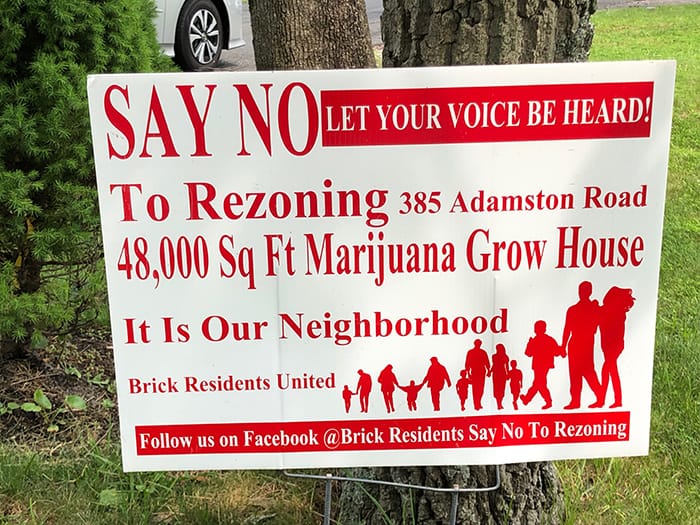
BRICK – There have been a number of twists and turns in an application by Jersey Shore Therapeutic Health Care (JSTHC) which originally sought permission to build a 48,000-square-foot grow house to cultivate and sell medical marijuana at 385 Adamston Road, on the site of a former OceanFirst Bank.
The proposal resulted in a standing room only crowd during an October 2018 Board of Adjustment meeting, when there were heated exchanges between neighboring residents, who were opposed to the application, and pro-marijuana individuals and groups.
In March – in the wake of a new township ordinance that prohibits the retail sale, cultivation, manufacturing and testing of recreational marijuana in the township – JSTHC said they were taking sales out of the application, but they still wanted to use the property to cultivate and manufacture marijuana in the 48,000 square-foot grow house.

JSTHC’s attorney Dennis Galvin asked that the application be heard in front of the Planning Board instead of the Zoning Board. Since the property was already zoned for agricultural use, a use variance was no longer needed, he said.
Now, in a recent turn of events, JSTHC wants to grow lettuce in the proposed 48,000-square-foot grow house.
During a special Board of Adjustment meeting held on May 30, Board Attorney Ronald D. Cucchiaro said JSTHC had transferred the application to the Planning Board, “with no input from the Board of Adjustment or anybody else; they decided that was the proper forum.”
But the Planning Board expressed concern that it lacked jurisdiction, so the application was sent back to the Board of Adjustment for a “narrow and exclusive function” for the board to determine whether certain uses are permitted in the Rural Residential zone, he said.
“This is not an application seeking approval for a use, so this board will not be denying or approving any sort of use on the subject property,” he said.
“The only thing this board has been tasked with doing as a result of the transfer from the Planning Board, is determining whether certain uses are permitted on the property, and if they are permitted, that means the Planning Board would be the proper board for jurisdiction,” Cucchiaro said. “If they are not permitted, it would mean that the [Board of Adjustment] would have jurisdiction.”
Board members were tasked with interpreting language in a township ordinance that allows “customary and conventional” farming in the Rural Residential zone, which is not zoned for commercial use.
“Anything that has to do with being pro- or anti- a particular use, opinions from the public, representatives of the developer and others are not relevant to what the Board has to consider,” he said.
Attorney for the applicant Dennis Galvin said he objected to the procedure. “Our position at this point is that we merely want to grow an agricultural product, and I know that’s a big sea change from what the original ask was, but we’ve decided to go in this direction,” he said. “The property is zoned agricultural.”
Galvin said there is nothing in the ordinance that prohibits this.
“Our position is tainted by what happened previously,” he said. “If we had proposed lettuce 10 months ago, there would be no issue.”

Edward Liston, an attorney who was hired by neighboring residents of the proposed grow house, said even though the application went from marijuana to hemp to lettuce, the proposed 48,000 square-foot building has the same design, the same layout, same electricity, and even has labs.
“That tells a tale, it tells a story,” Liston said. “It’s disingenuous because they are laying the groundwork to do what they planned to do in the beginning.”
Liston called the plan to grow lettuce “a Trojan horse,” and said that “customary and conventional” farming as stated in the ordinance does not include indoor farming.
The Board was asked to vote on two separate questions. The first was “Are farming operations in a building this size customary and conventional?” And the second question was, “Is the growing of marijuana and hemp a customary and conventional farming operation in that zone?”
They voted unanimously that the language in the ordinance does not permit medical marijuana or industrial hemp cultivation in the zone, and they voted that indoor cultivation in the proposed 48,000 square foot grow house was not customary or conventional.
After the meeting, Galvin was asked if his client would consider eliminating the grow house in favor of outdoor farming. He said absolutely not.
“We have rights, and our rights aren’t being respected,” Galvin said. “What’s the difference if it’s a [48,000 square foot] building or houses?”
Galvin said his client may appeal the Board’s decision.






